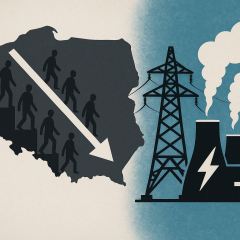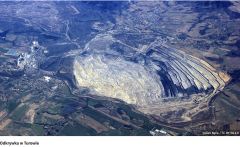PZU insures over 60 percent of Polish CO2 emissions.The Foundation “DY-OPMN” checks if the company breaks the OECD guidelines.
More than a year ago, we filed a notification of a violation of OECD Guidelines for international enterprises by PZU SA.
At the beginning of August, the OECD National Contact Point for responsible business made public the final assessment in this matter.
The Foundation's comments were considered justified.
PZU Health? PZU Life? PZU Mining!
Before the intervention of the Foundation "Development Yes – Open-Pit Mines No" (“DY-OPMN”), PZU did not report in its non-financial reports about the impact of the activities of the insured and financed by entities from the PZU Capital Group on the climate and the environment.
In other words - neither the shareholder nor the investor interested in PZU services had the opportunity to learn that this financial group insures over 85 percent of hard coal extraction and two-thirds of lignite in Poland and 60 percent of Polish carbon dioxide emissions, including the largest CO2 emitter in Europe - Bełchatów power plant.
"Failure to include in the enterprise reports information on the scale of investment of enterprises in the high-carbon sector and share in the corporate market of high-carbon sector, also meant that most consumers did not get a full picture of the nature and scope of the enterprise's activities, including information on the effects of activities of other related enterprises with the Company as a result of investment or insurance decisions, ” wrote the Foundation in a notification.
Coal investment insurance ceases to be a standard among insurance companies.
Over the past two years, six out of eight major players on the Polish insurance market have announced that they will not insure new coal power plants and mines.
This means that the planned hard coal and lignite mines such as the Złoczew open-pit and the Ościsłowo open-pit can only be insured in Poland by TUiR Warta (owned by German Talanx) and PZU SA.
Coal becomes uninsurable
“We have no choice. A world with a temperature 2°C higher can probably be insured, but with 4°C warming it will be impossible "- said in 2015 Henri de Castries, contemporary CEO of AXA.
In the face of a climate catastrophe, more reinsurance and insurance companies stop reinsuring and insuring fossil fuels. Large companies buy some insurance to guarantee that even in the event of huge damages being paid out enterprises will not lose financial liquidity.
Up to 2018, the leaders of energy reinsurance in Poland were Munich Re and Swiss Re.
However, a year ago, Munich Re decided to discontinue insurance and reinsurance of new coal mines and power plants, and Swiss Re limited insurance and reinsurance for both: existing coal power plants and those under construction. The decision to limit reinsurance and insurance of coal risks of new coal projects has also been taken so far by other global reinsurance majors - Hannover Re, MAPFRE and SCOR.
Insurance giants such as Allianz, AXA, Generali, Zurich as well as Vienna Insurance Group and UNIQA operating on the Polish market have decided to leave the new coal projects insurance sector.
To sum up - it is increasingly difficult for Polish insurers to place the coal risks on the reinsurance market and due to their growing importance for the Polish coal sector, the price of reinsurance services will increase in the coming years as the number of entities offering reinsurance of new coal projects decreases. Additionally, insurance for new and existing coal infrastructure is also becoming more expensive and harder to find. This is no longer just the case of European insurers. The decision to end the insurance of new coal projects was also made by the two largest insurance companies in Australia - QBE and Suncorp and the largest private insurer in the United States - Chubb.
Since the Foundation “DY-OMPN” joined the international UnFriend Coal coalition in December 2017, all insurance companies insuring the Polish coal sector since 2013, except for PZU and Warta, have introduced criteria that make it impossible to insure new coal projects.
Insure our future!
Since October 2018 representatives of the Foundation repeatedly met with representatives of PZU. They demanded the creation and publication of a policy regarding respect for human rights and the environment, as well as the presentation of PZU's attitude towards the issue of greenhouse gas emissions and a climate disaster in a non-financial report.
As a result of the Foundation's intervention, in the 2018 report, PZU devoted more attention to climate issues and responsibility for them.
However, the company still refuses to include in its reports information about the harmfulness of the activities of the entities it insures.
Paweł Surówka PZU CEO explained during the shareholders meeting at the end of May 2019:
"The ESG principles balance the principle of the environment with social elements and complying with local regulations and good practices that exist in a given country.
For this reason - respect for social elements and compliance with laws and regulations - the PZU Group does not intend to impose its standards on clients.
We assume that the best and most constructive contribution that we can give to the global fight against emissions and caring for a better environment is to set a goal by our own example and to invest in solutions and companies that achieve it. "
"PZU believes that the insurance of Polish coal companies and the construction of new power plants such as the controversial Ostrołęka C or Złoczew open-pit lignite mine do not undermine the actions to quickly and radically reduce greenhouse gas emissions to prevent even more intense droughts, hailstorms, floods and hurricane winds also in Poland.” - comments Kuba Gogolewski, senior financial campaigner of the Foundation "Development YES – Open-Pit Mines NO" - "What's more, insuring companies that sell coal to households, which is one of the causes of smog and as a result of greater exposure of Poles to illnesses associated with poor air quality, and while offering health and sickness insurance as well as medical services, PZU is trying to have a cake and eat it. "
Resignation from coal insurance by the largest financial group in Central and Eastern Europe would undoubtedly have a huge impact on accelerating the transformation of the Polish energy sector.
Therefore, we will not stop looking at PZU and demanding that it stops to underwrite both new and existing coal power plants and mines.
Next year we will meet again with PZU representatives and check whether they have started and complied with OECD guidelines.







